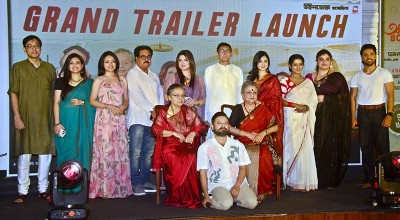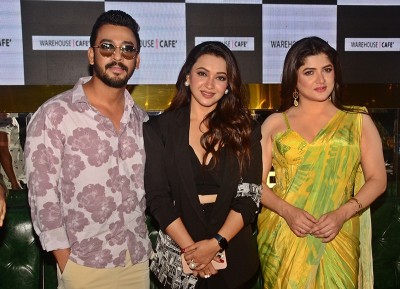 Lata Mangeshkar
Lata Mangeshkar
'She will be immortal, her legacy will live on forever': Sharmila Tagore on Lata Mangeshkar
Bollywood superstar of yesteryears, Sharmila Tagore, said Lata Mangeshkar's demise is a loss of "someone who had a profound knowledge of artistry" that reverberated in her work as she rendered her voice to generations of actors.
"She has left behind an incredible legacy..she is gone.. she is no more.. We have to accept it but we all know that she is immortal and her legacy will live on forever," Sharmila Tagore told NDTV in an interview.
"I feel a little bit numb, a link to our past is gone. I feel saddened..someone who knew so much about artistry has left us," Tagore, for whom Lata Mangeshkar has sung scores of songs through the span of her career, said.
The actor traced her connection with Lata Mangeshkar to her childhood when her mother sang Lata Mangeshkar's first song "Ayega Ayega Anewala" from the film "Mahal".
"...my mother would sing this song..and years later Lata Ji sang for me, too, after of course singing for Madhubala in many hit films such as Mughal-e-Azam and so many other actors," Tagore said.
"Through the decades she lent her voice to so many newcomers.. to me...to my daughter Soha and similarly to the generation of actors like Shobhana Samarth, her daughters - Nootan and Tanuja - and then to Tanuja's daughter Kajol," she said.
The actor attributed Lata Mangeshkar's presence in the Indian playback singing scene for more than seven decades to her naturally beautiful voice which she was gifted with.
"...because she could do that..because she had such a naturally beautiful voice, so many singers want to do that, but they can't maintain that effort over a period of time," Tagore said.
Recalling her time in the Hindi film industry when she played lead roles in movies, Tagore shared moments when she witnessed how Lata Mangeshkar brought in her masterstroke in the songs by adding the nuances, the range of emotions that were desired by the directors.
"She didn't have to make much effort, she was gifted with that beautiful voice and she could render all kinds of songs because of her immense talent along with her strong training in classical music," Tagore said.
"I remember Shakti Ji taking me to the recording. And, in those days, they recorded the songs with a full orchestra. I saw Lata Ji in a small glass cubicle and all she did was just glance through and hum a little. It was not even a rehearsal. And then she sang and it was okayed! So you can imagine how well-trained she was, how well she knew the art, and how correct she was that she got the song instantly and recorded the song right away," she recollected.
"Everyone wanted to work with her because she could render a range of emotions, was so versatile. She could bring out everything effortlessly whether it was romantic or a devotional song or one full of naughtiness or just anything," she said.
She recollected, how in the song "Bada Natkhat He Tu Krishna Kanhaiya" in the blockbuster film "Amar Prem", Mangeshkar's singing helped her to enact a variety of emotions from deep affection to playing to the activities of the little boy, who kept hiding in the song, forcing her to play hide-and-seek with him.

Sharmila Tagore in the song "Bada Natkhat He Tu" sung by Lata Mangeshkar in film Amar Prem (1972)
"In this song, where I am looking for my son, there was this little bit of playfulness between me and the child. It was already in the song, she had sung it like that.. all I had to do was just follow it. While the audience was listening to Lata Ji's mellifluous voice, it helped me to display all the emotions, enhancing my performance," Tagore reminisced.
"The way she sang those songs, what we had to do was very clear to us..because all those nuances were in the words and in her singing.. the way she sang made it very easy for us," she added.

From Left to Right: Sharmila Tagore with Sanjeev Kumar in the song "Dil Dhundta He" sung by Lata Mangeshkar and Bhupinder Singh in film Mausam (1975); Sharmila Tagore in song "Kitni Akeli Thi" sung by Lata Mangeshkar in film Talash (1969)/ Image Credit: Video Grab
"All the songs she has sung for me in Mausam, in Anupama, Satyakam, Talash and so many more, she rendered the emotions as were suited to the characters and the situations in each case. For example, the song Junali Raat Ma in Talash.. we were dancing... that verve, that vivacity, youthfulness were all there in that song. Whatever the sequence required, whatever the directors wanted, she was ideal," the actor added.
.jpg)
Sharmila Tagore and Rajendra Kumar dancing on song Junali Raat Ma rendered by Lata Mangeshkar and Mohd. Rafi in film Talash (1969)/ Image Crdit: Video Grab
It wasn't easy even for Lata Mangeshkar to reach the pinnacle and she made her way by accepting disapproval, transforming them into her strengths and producing flawless work every time she was in the recording room.

Lata Mangeshkar with Pakistani singer Noor Jahan (Image Credit: Wikipedia)
Tagore said: "Lata ji debuted in the era of Shamshad Begum and Noor Jahan, who were reigning the Hindi film industry at the time. Since a lot of lyricists were Muslims, who wrote in Urdu, music directors pointed out her Marathi accent and Lat Ji felt it was something she needed to focus on. So, she worked on the language and perfected her pronunciation."
Love for cricket
Asked about her shared interest in cricket with Lata Mangeshkar, Tagore said: "She was an absolute cricket buff and we saw a couple of matches together from the Patiala Pavilion as it was a little secluded which Lata Ji preferred.
"Once she asked me about the details of a match like who scored how many runs but I failed to answer. She was a little disappointed and she told me that I should know these things, being married to a cricketer."
Tagore said Mangeshkar's love for cricket wasn't just restricted to watching the games.
"Yes, she knew a lot. Her liking for cricket was not limited to just watching the matches, she understood the game," she said.
Sharmila Tagore's husband and India's youngest skipper as well as a legendary cricketer Mansur Ali Khan Pataudi was a great fan of Lata Mangeshkar, she revealed.
"Tiger was a great fan of Lata Ji's. Girish Karnad had told me that in his university days, Tiger would listen to all Lata Ji's songs. Later, he played to me 'Chaudhavi Ka Chaand' on flute. He had a wonderful photograph with Lata Ji, which is with me now," she said.
Sharmila Tagore revealed how Lata Mangeshkar had reached out to Indian cricketers and raised money to recognise their efforts for winning the 1983 Cricket World Cup.

Indian skipper Kapil Dev lifting the World Cup after winning the tournament in 1983 (Image Credit: Video Grab)
"After 83, when India won the World Cup, Lata Mangeshkar had organised a cricket concert and raised Rs 20 lakhs for the team because the BCCI at that point wasn't the BCCI of today. They didn't have that kind of funds or they didn't use that kind of money.
"So, Lata Ji came forward and her brother Hridaynath Mangeshkar composed music. Her involvement with cricket went beyond as a spectator. She actually tried to help the cricketers."
A multifaceted personality
Tagore also pointed out the variety of interests Lata Mangeshkar had, especially, wildlife photography, and how she pursued them with passion.
"She loved wildlife. Though she was of a private disposition and didn't really talk very much, she didn't miss anything. She could engage with you on a variety of topics. She loved going to the Jungle and taking photographs.
"She had clicked great photographs and I would request the family perhaps if they could hold an exhibition of the photographs she had taken. It would be such a treat for us!" Tagore said.
Singer with the power to unite
Lata Mangeshkar was an artist beyond borders, whose appeal was widespread, Tagore said, adding that she was the first Indian singer to sing in the Royal Albert Hall.
In 1962, when India was in deep trouble following China's sudden attack, the government needed to bring people together to tide over the grave situation.
"India's morale was low, there was a lack of jobs, food grains and so many other things. They needed her voice to unite people.
"Her voice had that magic that could unite and bond people from one corner of India to another from Kashmir to Assam to anyone who was glued to her voice. That song inspired people, evoked patriotism. When Lataji sang -Aye mere watan ke logo, it was a very difficult time for India. People donated money, foodgrains, jewellery of their own accord.
"That song still sends goosebumps through you!"
Concluding the interview, Tagore said: "She will be immortal and her legacy will live on forever. She will be in our hearts. She has made a place for herself in our hearts. That will not go away.. she may have left us physically but she will always remain with us."
Support Our Journalism
We cannot do without you.. your contribution supports unbiased journalism
IBNS is not driven by any ism- not wokeism, not racism, not skewed secularism, not hyper right-wing or left liberal ideals, nor by any hardline religious beliefs or hyper nationalism. We want to serve you good old objective news, as they are. We do not judge or preach. We let people decide for themselves. We only try to present factual and well-sourced news.







